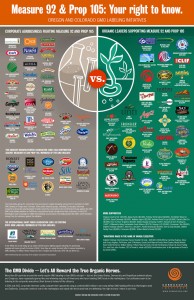I’ve posted about this topic in general before, explaining what a GMO (Genetically Modified Organism) is and why it might be a bad idea to set it free in the environment, let along eat one. Click here to catch up. For years, the “Right to Know” movement has been gaining force, with people demanding that there be a requirement that foods containing GMOs be labeled as such, much like foods containing allergens (peanuts, etc.) or dairy products produced with bovine growth hormone. The general thinking here is that if we can’t legislate against the use of GMOs in our food, at least we can force manufacturers to admit when they are using them and vote with our wallets. Right now, GMOs are sneaking onto our food supplies in a lot of hidden, insidious ways.
 This voting season, ballots measures in Oregon and Colorado (two of the craziest liberal states?) are up that, if passed, will require food manufacturers to admit when they are using GMOs in their products so consumers can decide for themselves if they want to eat them. The Cornucopia Institute, a nonprofit watchdog agency, just released a good infographic showing which companies are donating big sums of money to either side of the political campaign. Some big spenders on the Pro-GMO side are no surprise: agorchemical giant Monsanto donated millions against our right to know, for example, but who would have expected Santa Cruz Organics, Lara Bar, Kashi, and Annie’s mac-and-cheese? Turns out, those companies are owned by food giants General Mills and Kellogg, who have a vested interest in us not knowing exactly what goes into their products.
This voting season, ballots measures in Oregon and Colorado (two of the craziest liberal states?) are up that, if passed, will require food manufacturers to admit when they are using GMOs in their products so consumers can decide for themselves if they want to eat them. The Cornucopia Institute, a nonprofit watchdog agency, just released a good infographic showing which companies are donating big sums of money to either side of the political campaign. Some big spenders on the Pro-GMO side are no surprise: agorchemical giant Monsanto donated millions against our right to know, for example, but who would have expected Santa Cruz Organics, Lara Bar, Kashi, and Annie’s mac-and-cheese? Turns out, those companies are owned by food giants General Mills and Kellogg, who have a vested interest in us not knowing exactly what goes into their products.
Currently, Maine and Connecticut are the only states where consumers can tell if GMOs are in their food. Hopefully, Oregon (and others?) will soon follow suit. This is another sad instance where we’re lagging behind 65 other countries in protecting the health of our population in favor of making it easier on big corporations.

